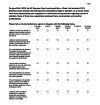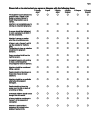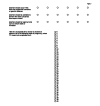Osteopathic Medical Students' Concerns About the Future of Abortion Education and Training Post-Roe v. Wade
- PMID: 38854304
- PMCID: PMC11162593
- DOI: 10.7759/cureus.60030
Osteopathic Medical Students' Concerns About the Future of Abortion Education and Training Post-Roe v. Wade
Abstract
Background In the United States, new regulations on access to abortion and, in some cases, penalization of physicians who provide abortions, have been established on a state-by-state basis. The American College of Obstetricians and Gynecologists recommends that medical schools include abortion training in their curriculum. It is still unknown if the Dobbs decision will limit medical students' abortion training and/or discourage them from pursuing a career in obstetrics. The goal of this study was to investigate the attitudes of medical students toward abortion following the Dobbs decision and their beliefs about its possible effect on future medical education and practice. Methods This cross-sectional, observational study collected data from students enrolled in a Florida, United States osteopathic medical school using an anonymous online questionnaire from February to March 2023. The questionnaire contained 35 items that addressed medical students' attitudes towards a range of potential implications on medical training due to the new abortion restrictions. Hypothesis testing was performed using Spearman's rho correlation and multivariate linear regression to explore the relationship between the predictor variables (concerns about future practice regarding abortion, religiosity, and acceptability of abortion based on gestation age) and the predicted variable (attitudes about abortion). Data were analyzed using Statistical Package for the Social Sciences (IBM SPSS Statistics for Windows, IBM Corp., Version 28.0, Armonk, NY). Results In total, 158 participants completed the questionnaire; 91 (57.6%) were women. The mean age was 25.8 (range 21-37 years). Using a stepwise regression analysis, only the variables shown to be statistically associated (per Spearman's rho bivariate correlation) with the predicted variable (abortion attitudes) were entered into the model (i.e., concerns about abortion education and future practice, religiosity, and abortion acceptability based on gestational age). A significant regression equation was found (F(3,134) = 205.750, p < 0.001, R2 = 0.822, R2 adjusted = 0.818). The percentage of variance in the scores accounted for by the model was 82%. Higher levels of feeling that the abortion ban would negatively affect their training and future practice, greater religiosity, and acceptability of abortion at later gestation ages were statistically significant predictors of more positive attitudes toward abortion in this sample of osteopathic medical students. Conclusions The results suggest that the attitudes of medical students toward abortion are related to multiple factors, including concerns about future abortion training, religiosity, and the week of pregnancy acceptable for a woman to have an abortion. Findings also highlight the attitudes of medical students in response to more restrictive abortion legislation, emphasizing their desire for possible curricular enhancements to safeguard their training and education.
Keywords: abortion; curriculum; dobbs decision; medical education and training; reproductive health; women’s health; women’s rights.
Copyright © 2024, Zielinski et al.
Conflict of interest statement
The authors have declared that no competing interests exist.
Figures






Similar articles
-
Predictors of Abortion Attitudes in Medical Students After the Reversal of Roe v. Wade.Cureus. 2023 Feb 24;15(2):e35421. doi: 10.7759/cureus.35421. eCollection 2023 Feb. Cureus. 2023. PMID: 36987475 Free PMC article.
-
Student and Physician Views of How the Dobbs Decision Affects Training and Practice Location Preferences: Cross-Sectional Questionnaire Study.Interact J Med Res. 2025 Jan 7;14:e55035. doi: 10.2196/55035. Interact J Med Res. 2025. PMID: 39773422 Free PMC article.
-
Impact of the Dobbs v Jackson Women's Health Organization decision on retention of Indiana medical students for residency.Am J Obstet Gynecol MFM. 2023 Nov;5(11):101164. doi: 10.1016/j.ajogmf.2023.101164. Epub 2023 Sep 30. Am J Obstet Gynecol MFM. 2023. PMID: 37783276
-
The ongoing crisis of abortion care education and training in the United States.Curr Opin Obstet Gynecol. 2022 Dec 1;34(6):373-378. doi: 10.1097/GCO.0000000000000825. Curr Opin Obstet Gynecol. 2022. PMID: 36342010 Review.
-
Elizabeth Bagshaw: Pioneer of Canadian Women's Health.Cureus. 2024 Jul 18;16(7):e64845. doi: 10.7759/cureus.64845. eCollection 2024 Jul. Cureus. 2024. PMID: 39156423 Free PMC article. Review.
References
-
- Dobbs v. Jackson Women's Health Organization, 597 U.S.__(2022) [ Apr; 2024 ]; https://supreme.justia.com/cases/federal/us/597/19-1392/ Dobbs v. Jackson Women's Health Organization. 2022 2023:597.
-
- An act relating to abortion, including abortions after detection of an unborn child's heartbeat; authorizing a private civil right of action. Bill text: TX SB8 | 2021-2022 | 87th Legislature. [ Apr; 2023 ]. 2021. https://legiscan.com/TX/text/SB8/id/2395961 https://legiscan.com/TX/text/SB8/id/2395961
-
- An act relating to prohibition of abortion; providing a civil penalty, creating a criminal offense, HB 1280, 87th Leg (TX 2021) [ Apr; 2024 ];https://capitol.texas.gov/tlodocs/87R/billtext/pdf/HB01280F.pdf 2021 13:2023.
-
- Interactive map: US abortion policies and access after Roe. [ Apr; 2024 ]. 2023. https://states.guttmacher.org/policies/connecticut/abortion-policies https://states.guttmacher.org/policies/connecticut/abortion-policies
-
- Guttmacher Institute. State bans on abortion throughout pregnancy. [ Apr; 2024 ]. 2023. https://www.guttmacher.org/state-policy/explore/state-policies-later-abo... https://www.guttmacher.org/state-policy/explore/state-policies-later-abo...
LinkOut - more resources
Full Text Sources
Miscellaneous
